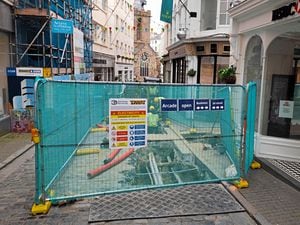Climate change targets are not tough enough
GUERNSEY needs to do more to fight climate change, according to a member of the Environment Department.
GUERNSEY needs to do more to fight climate change, according to a member of the Environment Department. 'We should be able to do much better than the UK in reducing carbon emissions and go for targets of at least 20% below the 1990s by 2010,' said Deputy David de Lisle.
Environmental pressure group Friends of the Earth has lobbied the UK government to introduce climate change laws to see it reduce its carbon emissions by 20%.
The States, through formal ratification of the Kyoto Protocol, has agreed to reduce CO2 emissions by 12.5% in Guernsey by 2010.
Environment minister Bernard Flouquet said the department did not think legislation was necessary.
'There are a number of factors behind the reduction, including the cable link with France and a reduction in emissions from the island's agricultural and horticultural industries.
'Guernsey is already successfully beating this voluntary target and therefore making its own contribution to reducing greenhouse gases.'
Deputy de Lisle said that the fact that the island relied on a power cable from France to reduce its carbon emissions showed the island's dependency. He said it should be more self-sufficient and needed to do much more to combat climate change by targeting road users.
'We have got to look at favouring low emission vehicles and penalising gas guzzlers on our roads. And we've got to ensure that fuel prices increase in real terms to reduce the number of journeys made on the roads. And we have got to start looking at renewable fuels and means of transport.'
Friends of the Earth has also called on the UK government to monitor annually its carbon emissions.
Deputy de Lisle said that Guernsey was doing that but needed to set targets. And he said it needed to put more resources into researching and developing renewable power from renewable sources, such as wind and wave energy.
He said there were also health risks attached to not reducing carbon emissions. He claimed that levels of pollution - mostly caused by vehicle exhausts - were responsible for about 10,000 deaths per year in the UK.
'That is very serious because it means 10 or more deaths in Guernsey possibly. Here we are banning smoking, but there is a bigger killer out there in terms of carbon exhausts from motor vehicles.'
Director of Public Health Dr David Jeffs, speaking about the significance of Guernsey's contribution to combating climate change earlier this year, said: 'If a fairly affluent jurisdiction like Guernsey isn't prepared to make changes to help protect the environment, how could you expect other countries and poorer countries to do so?'
National Trust of Guernsey president Roland Ogier said the island should look to the opportunities presented to it through harnessing wind, wave, and solar energy. And he said the island could market itself through its technological approaches.
'It is not only responsible in terms of global energy, it may well be of wider interest,' he said.





